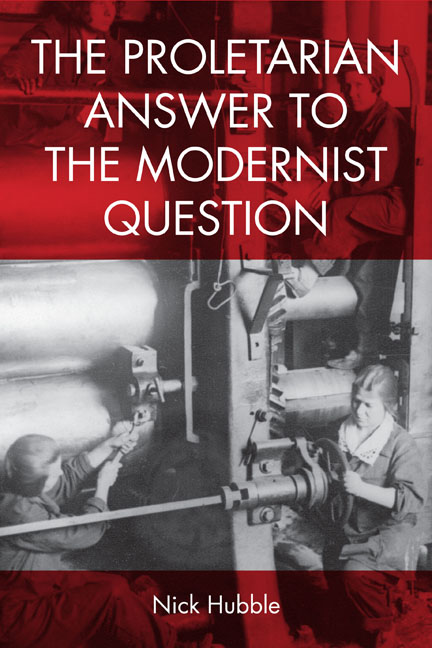Book contents
- Frontmatter
- Contents
- Acknowledgements
- Introduction
- 1 ‘Her Heritage Was that Tragic Optimism’: Edwardian Pastoral
- 2 ‘The Common Life’: Women and Men after the General Strike
- 3 ‘She Had Finished with Men Forever’: Lewis Grassic Gibbon's Grey Granite
- 4 ‘The Raw Material of History’: John Sommerfield's May Day
- 5 ‘None of That “My Good Woman” Stuff’: Outsider Observations
- Conclusion
- Bibliography
- Index
Conclusion
Published online by Cambridge University Press: 23 June 2018
- Frontmatter
- Contents
- Acknowledgements
- Introduction
- 1 ‘Her Heritage Was that Tragic Optimism’: Edwardian Pastoral
- 2 ‘The Common Life’: Women and Men after the General Strike
- 3 ‘She Had Finished with Men Forever’: Lewis Grassic Gibbon's Grey Granite
- 4 ‘The Raw Material of History’: John Sommerfield's May Day
- 5 ‘None of That “My Good Woman” Stuff’: Outsider Observations
- Conclusion
- Bibliography
- Index
Summary
The proletarian answer to the modernist question was not the welfare state. The 1945 political settlement ushered in a period in which neither proletarian literature nor modernism flourished. The hopes of writers such as Mitchison, Gibbon, Lawrence and Woolf for moving beyond patriarchal binary thought were not achieved. The ‘old pastoral’ form of British postwar culture had more in common with the music-hall modernism and Edwardian pastoral of an earlier generation of writers such as Wells, Galsworthy and Ford. Orwell harked back to these models in works like The Road to Wigan Pier and The Lion and the Unicorn. This is not to say that the period covered by the first three or four postwar decades was a ‘bad one to live in’ (Orwell 1998: 102). The positive aspects of this period included the centrality of public representations of workingclass collectivity, which included some space for the expression of working women's desires and agency as expressed in certain popular works of proletarian literature, such as Greenwood's Love on the Dole and Sommerfield's Trouble in Porter Street. The political legacy of that period lies in the various equalities legislation it gave rise to, including the 1970 Equal Pay Act. However, there is also another legacy of that period, which dates back to the proletarian-modernist literature of the late 1930s. The spread of self-reflexivity in the private sphere, as shown in Mass- Observation diaries, was a testament to both the democratising of culture embodied by the public visibility of proletarian literature in the 1930s and the influence of modernist writers, such as Woolf. As Hinton notes, The Common Reader, Orlando and A Room of One's Own were all published by Penguin during the period 1939–45: ‘Virginia Woolf, we might argue, did more to construct modern selfhood than a far more widely read writer like J. B. Priestley, despite the latter's mastery of the means of mass communication’ (Hinton 2008: 219).
In 2017 we have reached a point where the basic features of the welfare state – full employment, paid holidays, family allowances and proper healthcare – are now either gone or under threat.
- Type
- Chapter
- Information
- The Proletarian Answer to the Modernist Question , pp. 197 - 201Publisher: Edinburgh University PressPrint publication year: 2017



